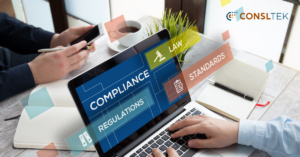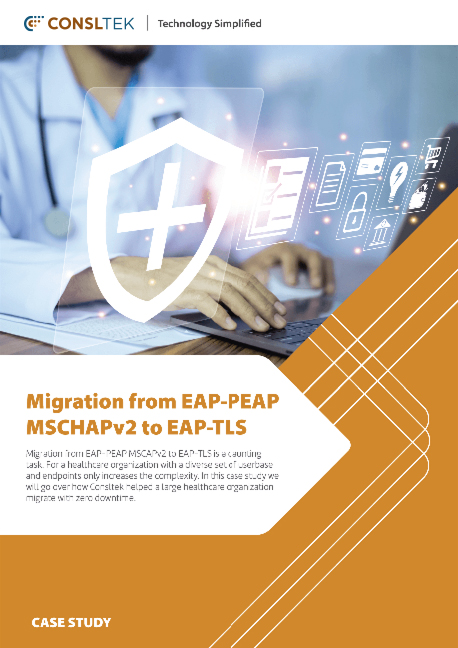Compliance management is no longer a legal checkbox; it’s a strategic imperative that touches every aspect of your organization. The impact is even more pronounced across different industries such as healthcare, finance, and manufacturing, where regulations can vary significantly. For marketing, finance, legal, HR, supply chain, and logistics leaders, understanding how technology aids in navigating these varied compliance landscapes is essential. This guide explores how industry-specific regulations affect each function and highlights the transformative power of Governance, Risk, and Compliance as a Service (GRCaaS).
Compliance Management Across Key Industries
Healthcare: Navigating Patient Data, Safety, and Quality Regulations
Healthcare is one of the most highly regulated industries, with stringent rules designed to protect patient information, ensure quality care, and maintain safety standards. Here’s how compliance varies by function within healthcare:
Marketing: Healthcare marketers must comply with HIPAA (Health Insurance Portability and Accountability Act), which governs the privacy and security of patient data. Violations can result from improperly handling patient testimonials or using personal data without consent. Compliance software helps automate consent collection and monitor data use in marketing campaigns, ensuring that promotions adhere to HIPAA and other state-level privacy laws, such as the California Confidentiality of Medical Information Act (CMIA).
Finance: Financial departments in healthcare must adhere to regulations like the Anti-Kickback Statute and Stark Law, which prohibit financial incentives for patient referrals. GRC tools help finance teams automate financial reporting, track compliance with these laws, and ensure that financial dealings are transparent and auditable, avoiding severe penalties and reputational damage.
Legal: Legal teams in healthcare manage compliance with regulations like the False Claims Act (FCA) and HIPAA. Contract management systems ensure that all agreements, including those with vendors and suppliers, are compliant with these laws. For example, technology can track business associate agreements (BAAs) with vendors handling patient data, ensuring compliance with HIPAA.
HR: HR functions must comply with healthcare-specific labor laws, including OSHA’s Bloodborne Pathogens Standard, which ensures a safe working environment for healthcare workers. HR can use policy management systems to keep workplace safety protocols updated and accessible, ensuring compliance with both federal and state-level safety regulations.
Supply Chain: Supply chains in healthcare must adhere to FDA (Food and Drug Administration) regulations and Drug Supply Chain Security Act (DSCSA) requirements, which mandate strict controls over drug sourcing and distribution. Vendor compliance monitoring tools help ensure that all suppliers meet these stringent standards, reducing the risk of recalls or legal action.
Logistics: Logistics in healthcare must manage compliance with regulations like the Federal Food, Drug, and Cosmetic Act (FDCA), ensuring that medical products are stored and transported under specific conditions. Document management systems streamline the tracking of shipping conditions and ensure all documentation meets FDA audit requirements.
Finance: Managing Regulatory Complexity in a Highly Controlled Environment
The finance industry is subject to rigorous compliance standards to prevent fraud, protect consumer data, and maintain market integrity. Here’s how compliance varies by function:
Marketing: In finance, marketing teams must navigate regulations like FINRA (Financial Industry Regulatory Authority) rules, which govern advertising, social media, and communications to ensure that they are fair, balanced, and not misleading. Compliance tools can automate approval workflows, ensuring marketing materials adhere to these standards before publication.
Finance: Compliance for finance teams involves adhering to the Sarbanes-Oxley Act (SOX), Dodd-Frank Act, and Basel III for capital adequacy. Automated financial reporting tools help streamline compliance, ensuring accurate and timely filings with regulatory bodies like the SEC (Securities and Exchange Commission).
Legal: Legal departments in finance must manage compliance with laws such as the Foreign Account Tax Compliance Act (FATCA) and Anti-Money Laundering (AML) laws. GRC platforms provide real-time tracking of compliance metrics and ensure that all legal processes, including client onboarding and transactions, meet regulatory standards.
HR: Financial institutions are governed by employment regulations such as FINRA’s background check requirements and employee conduct rules. HR can leverage compliance management systems to ensure all employee data and background checks are properly documented and in line with industry standards.
Supply Chain: In finance, supply chain management often involves third-party risk management, particularly for vendors providing IT and data services. The Gramm-Leach-Bliley Act (GLBA) requires financial institutions to protect sensitive customer information, making vendor compliance monitoring critical for maintaining data security.
Logistics: Although less prominent in traditional financial services, logistics within fintech or banks dealing with physical assets must comply with regulations like the PCI DSS (Payment Card Industry Data Security Standard) for secure handling and transportation of sensitive financial data. Document management systems help maintain secure handling of these materials.

Manufacturing: Ensuring Compliance in Production, Safety, and Environmental Standards
Manufacturing faces a broad spectrum of compliance challenges, from worker safety to environmental impact. Here’s how compliance varies by function in this industry:
Marketing: Manufacturing marketing teams must comply with regulations such as FTC (Federal Trade Commission) advertising rules and industry-specific standards like REACH for chemical substances. Compliance management tools help ensure product claims are truthful and compliant with industry advertising standards.
Finance: Finance teams in manufacturing are responsible for compliance with regulations like the Sarbanes-Oxley Act and various tax codes, including state-specific environmental taxes. GRC tools automate financial compliance tasks, ensuring transparency in financial reporting and adherence to tax obligations.
Legal: Manufacturing legal teams deal with a complex web of regulations, including product safety standards like those set by OSHA, and environmental laws like the Clean Air Act and the Toxic Substances Control Act (TSCA). Contract management systems can streamline compliance with supplier agreements that must meet stringent safety and environmental standards.
HR: In manufacturing, HR must ensure compliance with the Fair Labor Standards Act (FLSA), OSHA’s workplace safety regulations, and industry-specific training requirements such as Hazard Communication Standards. Policy management systems ensure that all safety protocols are up-to-date and employees are trained accordingly.
Supply Chain: Manufacturing supply chains are subject to compliance with regulations such as the Conflict Minerals Rule and ITAR (International Traffic in Arms Regulations). Vendor compliance monitoring tools ensure that suppliers adhere to these regulations, reducing the risk of supply chain disruptions or fines.
Logistics: Manufacturing logistics must navigate compliance with regulations including the Department of Transportation (DOT) rules for transporting hazardous materials and customs regulations like the Harmonized Tariff Schedule (HTS). Compliance software automates tracking of these requirements, ensuring smooth and lawful transport of goods.

Why GRCaaS is a Game-Changer for All Industries
The complexities of compliance vary significantly across industries, making a one-size-fits-all approach ineffective. GRCaaS offers tailored solutions that adapt to the unique regulatory needs of each sector, providing specialized expertise, cost efficiency, and scalable compliance management that can grow with your business.
Benefits of GRCaaS
Expertise on Demand: GRCaaS providers bring industry-specific knowledge to the table, offering insights and best practices that help organizations navigate their unique regulatory environments without the need for extensive in-house expertise.
Cost Efficiency: Outsourcing GRC functions to GRCaaS providers allows organizations to reduce overhead costs associated with compliance teams, enabling businesses to maintain high standards of compliance without draining resources.
Scalability: GRCaaS adapts to the evolving regulatory landscape, providing solutions that scale as your organization grows or enters new markets. This ensures continuous compliance without straining internal capabilities.
Centralized Compliance Management: A unified GRC platform fosters collaboration across departments, offering easy access to compliance information and ensuring that all teams are aligned on regulatory standards.
Continuous Monitoring and Improvement: GRCaaS providers offer ongoing oversight of compliance, keeping organizations up-to-date with changes in regulations and allowing for proactive adjustments to avoid potential violations.
Conclusion: Embrace Technology and GRCaaS to Stay Ahead
As regulations continue to evolve across industries, leveraging technology and GRCaaS is essential for maintaining compliance while driving business growth. By embracing these tools, organizations can offload the complexities of compliance management to experts who tailor solutions to fit their specific needs, allowing internal teams to focus on strategic initiatives.
For leaders across marketing, finance, legal, HR, supply chain, and logistics, the call to action is clear: compliance is not just an IT issue—it’s a business-wide priority. Partner with those who have mastered the compliance landscape, use technology to stay ahead of regulatory challenges, minimize risks, and unlock new growth opportunities for your organization.


0 Comments